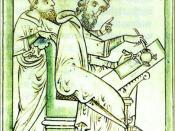The desire to seek the truth is the ultimate path towards a good just life. The life of Socrates is extremely complex to understand. Socrates did not posses wealth, power, or even popularity. Yet, his power of questioning and desire to examine life led him to a level of wisdom and reasoning. Most of the time his questions were more interesting than the answers themselves. According to Socrates, life is not valuable in itself. The good life is valuable, and it is this way of life that contains justice and happiness. Living the just life is the foundation for all that is good in one's life. Our appetites should never take control of life; it is reason that should be the true ruler of us.
Nonetheless, to seek the good just life, Socrates, used the power of questioning. Ion and the Iliad illustrates Socrates way of forcing the truth of reality while introducing the theme of justice.
Ion was the average rhapsody who focused on reputation and popularity. Socrates wanted to lead Ion to a point where he was questioning his own beliefs. "Why, then, are you clever about Homer but not about Hesiod or any other poets (Braman 10)." By questioning our own beliefs we can reach a state of openness. Socrates went through his entire life with extreme openness. Two of the greatest qualities that Socrates attained were wisdom and reasoning. These two aspects led Socrates to a theory of good life. The virtue of wisdom is to know that you do not know everything. Socrates wanted Ion to realize that without wisdom you will not see the truth. The truth comes from wisdom and openness; and the truth is what Socrates believed to be the ultimate goal to achieve.
Further, Socrates expresses the need to...


